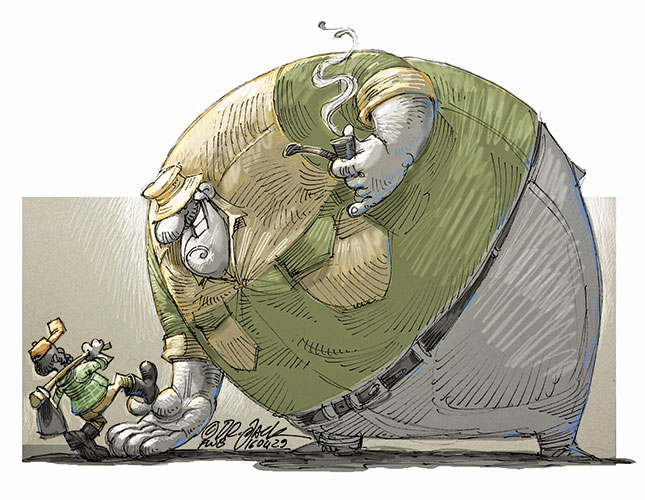
The day the agricultural sector in South Africa is fully transformed will be a proud day indeed. We want to see a stable and profitable agricultural sector. South Africa needs black commercial farmers. The poor in rural areas need to be empowered, and household food security is essential.
READ:The big problem with SA’s small farms
To achieve stability, the industry needs to become more inclusive. But we need to change the current manner in which we transfer skills and educate new farmers.
Radical land reform, as included in the current Green Paper on Land Reform, is not the answer. It seems as if some of the proposals in the Green Paper are based on the negative perceptions that all farmers are rich and refuse to ‘share’, and that farm workers are cruelly treated.
Don’t discriminate
Section nine of the Constitution guarantees freedom from discrimination. Government should tread carefully in order not to discriminate against anybody in the course of land reform, and in the process, compromise the long-term sustainable production of safe, affordable, top-quality food. We need new farmers to add to food security in South Africa.
They should be equipped to make optimal use of the resources at their disposal, and contribute to the production of food to achieve financial independence. I look forward to the day when there will be only two groups of farmers: those who are successful, and those who perform poorly, irrespective of creed or colour.
Growing will fight poverty
According to studies by the World Bank, growth in agricuture is on average at least twice as effective in reducing poverty as growth outside agriculture. The growth of the agriculture industry is the best opportunity to address unemployment, reduce poverty and turn around South Africa’s slow economic growth.
We as commercial farmers are more than prepared to support and add to the normalisation of our industry, to the benefit of our country and its people. However, very few commercial farmers have sufficient capital to enter into joint ventures with farm workers or other black farmers in the quest for transformation of the South African agricultural industry. State-guaranteed loans are vital to ensure long- term, sustainable and profitable land reform.
Why land reform is failing
Thus far, land reform and the transformation of the agriculture industry have failed due several reasons:
Beneficiaries cannot obtain ownership
Beneficiaries are disempowered by the fact that they cannot obtain ownership of the land they have been given. South Africans fought for empowerment and freedom. Until now, the policies implemented to transform the agricultural sector have taken away farmers’ freedom by not empowering new farmers with responsibility. Too much emphasis is placed on access to land. Failed land reform has resulted in vast areas of arable land that are not farmed optimally. Fallow tracts of state-owned land should be utilised for the establishment of new farmers. Mere access to land does not mean successful farming. There needs to be tenure security, training and access to financing. Farmers must be given the title deeds to the land they farm. This will allow them fiscal independence, to a certain extent, and room to manoeuvre economically.
Lack of access to finance
Farming is a high-risk industry. This risk cannot be placed only on the shoulders of government and industry. Farming is a business, and business is based on risk- taking. The person taking and managing the risk should be rewarded with profit or suffer loss. Farmers should be empowered by being given security of tenure, so that they can have access to finance. Efficient farmers will use these resources to produce a profit.
Lack of training and new technologies
There will always be space for smallholder and subsistence farmers, but these growers face many challenges: a lack of economy of scale, and equipment new technology, limited access to markets and finance, and a lack of skills development. All this is exacerbated by water scarcity – SA is by and large an arid country. Training and better use of new technologies will be required to make these farming operations more sustainable.
Successful transformation
Transformation needs to benefit the entire industry. Farmers must demand responsibility, and those who successfully manage risks will be rewarded.
Partnerships
More emphasis should be placed on the transfer of education, training and practical skills. If government creates a profitable agricultural environment, partnerships will follow because of the natural progression towards bigger production units worldwide. Government cannot force partnerships between new and commercial farmers. It will not work. Such partnerships must be economically beneficial for both participants.
Ensuring return on investment
South Africa’s land reform process is highly politicised and often the wrong people benefit from handouts. As profit margins are very low in agriculture, it is not viable to place the extra burden of financing development schemes on existing farmers. The constantly changing policy environment hampers investor confidence. Commercial farmers want to invest in their employees and enterprises, but need more structure and certainty about the possible return on their investments.
Resources and knowledge
The value chain discriminates on quality. It is its right to do so, since consumers demand it. Farmers must therefore be empowered with the resources and knowledge to produce better quality produce. Processors will then have a product to sell at a fair price.
The future of SA farming
The drought’s current effect on food prices provides a glimpse into the future, should South Africa be forced to become
a net importer of food. We, as farmers in South Africa, can be proud of the fact that we have managed to produce an oversupply of most agricultural commodities in the past. However, we have limited agricultural resources, and the annual population growth is about 1,35%.
All farmers in South Africa must accept these challenges and that we are part of the global village and continue to compete in the global market. Otherwise, South Africa will no longer be able to produce some of Africa’s most affordable food.
The views expressed in our weekly opinion piece do not necessarily reflect those of Farmer’s Weekly.
For more information, phone Willem de Chavonnes Vrugt on 082 946 2303 or email him at [email protected].
This article was originally published in the 29 April 2016 issue of Farmer’s Weekly.













